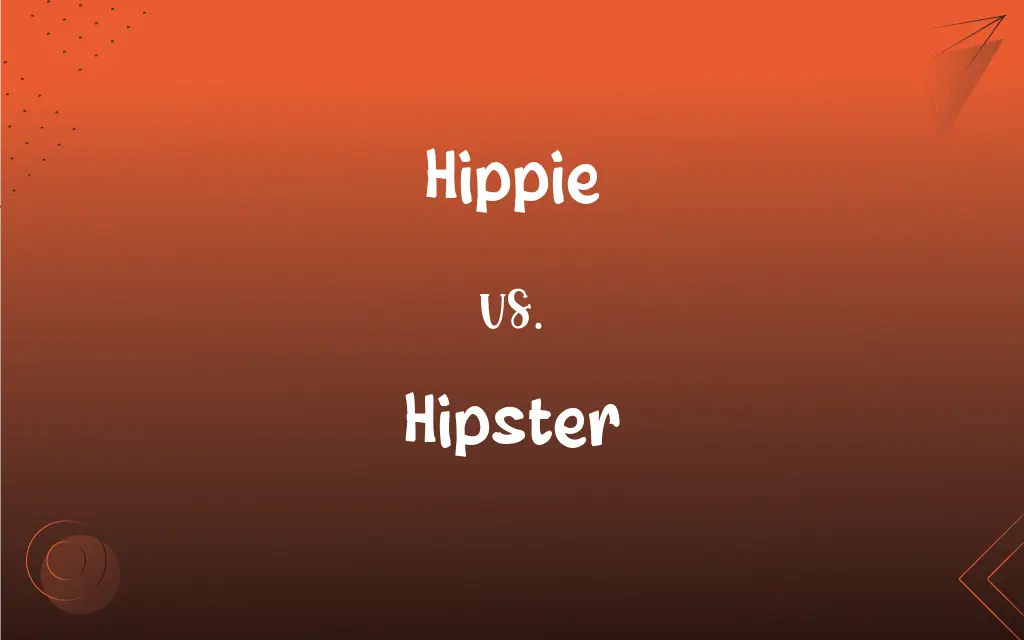Hippie vs. Hipster: What's the Difference?
Edited by Janet White || By Harlon Moss || Updated on October 23, 2023
A hippie is a person from the 1960s and '70s promoting peace, love, and communal living, while a hipster is a contemporary individual valuing indie culture, vintage styles, and countercultural trends.

Key Differences
Hippies emerged in the 1960s and '70s, primarily as a countercultural movement opposing the societal norms of that era. They advocated for peace, love, and understanding, frequently protesting against war and societal constraints. On the other hand, hipsters are a more recent subculture, originating in the 2000s, characterized by their appreciation for alternative arts, indie music, and a penchant for vintage and non-mainstream fashion.
While hippies are often associated with psychedelic music, free love, and a bohemian lifestyle, they also had a strong connection to nature, with many leading a back-to-the-land movement, embracing organic farming and communal living. In contrast, hipsters often dwell in urban settings, frequenting local coffee shops, craft breweries, and vinyl record stores. Their inclination is towards things that are "authentic" or "original," and they often reject what is considered mainstream or popular.
The hippie fashion often consisted of bell-bottoms, tie-dye shirts, and long, free-flowing hair. They embraced a natural look, sometimes even going barefoot. Symbols like peace signs and flowers were emblematic of their movement. Hipsters, however, can be seen sporting vintage or thrifted attire, thick-rimmed glasses, and often have tattoos or piercings. Their style, though retro-inspired, leans towards a modern, edgy twist.
Hippies and hipsters both represent countercultural movements, but they stem from different eras and have distinct philosophies and aesthetics. While hippies were largely about societal change, challenging the status quo, and seeking spiritual growth, hipsters are more about individual expression, embracing niche interests, and reclaiming past styles and tastes in a modern context.
Comparison Chart
Era
1960s and '70s
2000s onwards
ADVERTISEMENT
Philosophy
Peace, love, anti-war, and communal living.
Appreciation for the alternative, indie, and authentic.
Typical Setting
Communes, nature, music festivals.
Urban areas, coffee shops, craft breweries.
Fashion
Bell-bottoms, tie-dye, long hair.
Vintage, thick-rimmed glasses, modern retro.
Music Preference
Psychedelic rock, folk.
Indie, alternative, vinyl records.
Hippie and Hipster Definitions
Hippie
A member of a countercultural movement in the 1960s and '70s advocating peace and love.
The hippie attended Woodstock, a music festival celebrating peace and music.
ADVERTISEMENT
Hipster
A person who follows the latest trends, especially those outside the mainstream.
The hipster only shopped at local boutiques, avoiding big-chain stores.
Hippie
An advocate for peace, often opposing wars and conflicts.
The hippie movement was vocal against the Vietnam War.
Hipster
An individual with a strong affinity for indie music, art, and culture.
You can always find the hipster at the local underground music gig.
Hippie
A person who embraces nature, spirituality, and communal living.
The hippie community grew their own food and practiced meditation daily.
Hipster
A person who prides themselves on their unique, often countercultural tastes.
As a hipster, he loved discovering bands before they became popular.
Hippie
An individual with a bohemian lifestyle, often artistic or musically inclined.
The hippie played his guitar by the campfire, singing songs of freedom.
Hipster
Someone who adopts vintage styles and aesthetics in a contemporary setting.
The hipster restored old typewriters and used them for modern-day writing.
Hippie
Someone who rejects societal norms and conventions.
As a hippie, she chose to live in a commune rather than a traditional home.
Hipster
An urban dweller, often associated with modern bohemian traits.
The hipster café downtown served organic, artisanal coffee.
Hippie
A member of a counterculture originating in the United States in the 1960s, typically characterized by unconventional dress and behavior, communal or transient lifestyles, opposition to war, and liberal attitudes toward sexuality and the use of marijuana and psychedelic drugs.
Hipster
A young, usually urban bohemian who cultivates an ironic sensibility.
FAQs
What were some core beliefs of hippies?
Hippies often believed in peace, love, environmental conservation, and rejecting consumerist values.
Where did the term "hippie" originate?
It is believed to have evolved from the word "hipster", which was used to describe beatniks who moved into New York City's Greenwich Village and San Francisco's Haight-Ashbury district.
What does "hippie" mean?
A hippie refers to a person, especially from the 1960s and 1970s, who rejected established institutions, criticized middle-class values, and embraced spontaneity, peace, love, and communal living.
How did hippies dress?
Hippies often wore colorful, flowing clothing, headbands, bell-bottoms, and beads. They also popularized the peace symbol.
When did the hippie movement start?
The hippie movement started in the mid-1960s.
Why are hipsters sometimes criticized?
Critics argue that hipsters are inauthentic, pretentious, or co-opt elements of other cultures without understanding them.
Were hippies political?
While not inherently political, many hippies were involved in anti-war protests, civil rights movements, and other forms of activism.
What's the difference between a hippie and a bohemian?
While both embrace unconventional lifestyles, bohemian typically refers to artists and intellectuals who reject bourgeois values, whereas hippie focuses more on peace, love, and a connection to nature.
What does "hipster" mean?
A hipster refers to a person who follows the latest trends and fashions, especially those outside the cultural mainstream.
When did the term "hipster" first come into use?
The term "hipster" dates back to the 1940s, originally used to describe jazz aficionados.
How is "hipster" culture different from mainstream culture?
Hipster culture often values indie music, art films, local and organic food, and vintage or artisanal products over more mainstream choices.
What's the difference between a hipster and a hippie?
While both may reject certain mainstream values, hipsters are more associated with modern urban trends and fashions, whereas hippies are linked to 1960s and 1970s counterculture emphasizing peace, love, and nature.
Are hipsters primarily an American phenomenon?
While the term originated in America, hipster subcultures exist in cities around the world.
Do hippies still exist today?
Yes, while the original movement has faded, many people still identify with hippie values and aesthetics.
What characterizes hipster fashion?
Hipster fashion includes items like thick-rimmed glasses, vintage clothing, flannel shirts, and skinny jeans.
Is "hipster" still a relevant term today?
The definition and relevance of "hipster" have evolved over time. Some argue that the term has become too broad to be meaningful, but it's still used in popular culture.
What music is associated with hippies?
Psychedelic rock, folk music, and artists like The Grateful Dead, Janis Joplin, and Jimi Hendrix were popular among hippies.
Did hippies use drugs?
Some hippies used drugs like marijuana and psychedelics as a means of expanding consciousness or promoting peace and love. However, not all hippies used drugs.
Is "hipster" a derogatory term?
It can be. Some use it negatively to mock someone seen as trying too hard to be unconventional, but others self-identify as hipsters with pride.
Do hipsters have specific music preferences?
Hipsters often prefer indie rock, alternative music, and obscure or vintage tracks over top 40 hits.
About Author
Written by
Harlon MossHarlon is a seasoned quality moderator and accomplished content writer for Difference Wiki. An alumnus of the prestigious University of California, he earned his degree in Computer Science. Leveraging his academic background, Harlon brings a meticulous and informed perspective to his work, ensuring content accuracy and excellence.
Edited by
Janet WhiteJanet White has been an esteemed writer and blogger for Difference Wiki. Holding a Master's degree in Science and Medical Journalism from the prestigious Boston University, she has consistently demonstrated her expertise and passion for her field. When she's not immersed in her work, Janet relishes her time exercising, delving into a good book, and cherishing moments with friends and family.































































